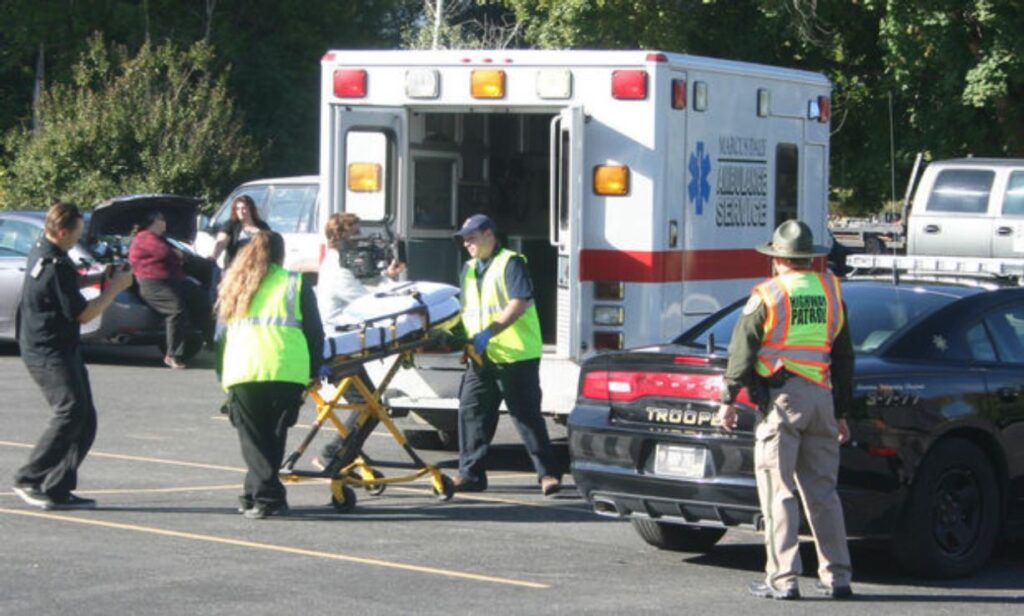
HAMILTON – Katelyn Lester is the “poster child” for preventing over-service of alcohol at bars and restaurants. Seventeen surgeries and a medical tab that exceeds $1 million prove it.
Five years after the automobile collision that almost took her life, Lester is playing an important role in a public-awareness campaign aimed at warning bartenders and party hosts to avoid serving people more alcohol than they can handle. The campaign is headed by the Ravalli County DUI Task Force, which is working with MAPS Media Institute to film a television spot in Hamilton that includes a reenactment of Lester’s Accident.
Task force coordinator Glenda Wiles said she has wanted for several years to address the problem of over-serving alcohol. Lester’s accident, caused by a drunken driver who was served too much alcohol at a bar in Florence, presented an opportunity to do so. “This is a particularly good local issue because she lives here, the accident occurred in Florence and she nearly died from the crash,” Wiles said. “Katelyn is the perfect poster child for going out and letting people know it happened to her. Montana Highway Patrol Trooper Rocky Bailey was the trooper who handled the accident, and he, too, is in our (public service announcement).”
Lester, who is a member of the DUI task force, watched the production process and shared the narrative of her accident.
“In June 2010 I was hit head-on by a drunk(en) driver, and I was trapped in my vehicle about an hour,” Lester said. “I was life-flighted to (St. Patrick Hospital). Once they established the extent of my injuries they flew me to Harborview in Seattle.”
Injuries included a torn aorta, bilateral femur break, broken jaw, broken eye-socket, large laceration down her face, broken ribs, bleeding from her spleen, liver and kidneys, and a broken arm.
“I was rushed in for emergency heart surgery and was in an induced coma for two weeks,” Lester said. “I was in Seattle for a month, then transferred here to a nursing home where I re-learned to walk and regained my strength. Had I not been wearing my seat belt I would not have survived.”
Lester has had 17 surgeries so far. More probably will be necessary, she said. “My medical bills have exceeded $1 million,” she said. “A Florence bar is where the man had been drinking that hit me, and I have a civil judgment against them but they have not paid a dime to me.”
Lester said she was two weeks from starting a job at a pre-release facility as a security officer when the accident occurred. She got her final interview call when she was in the intensive care unit and wasn’t able to accept the job. “I went to school to be a cop. That was all I ever wanted to do,” she said. “I will never be able to do anything like that because of my injuries. Since the accident I worked two able to do anything like that because of my injuries. Since the accident I worked two years at 9-1-1 dispatch, but the stress of that – my heart surgeon said ‘no more.’ ” The accident “disabled me for life,” Lester said.
“You never think it’s going to happen to you. It can happen to everyone,” she said. “That’s what I tell kids when I talk to them. I did everything right. I went to school and I went to college. I did everything I was supposed to do to see my dreams come true, and somebody else ruined that for me.”
Bailey, the Highway Patrol trooper, was one of the first responders on the scene and served as the investigating officer for the crash.
“I’m really glad the DUI task force is focusing on this topic,” he said. “One of the biggest contributors to DUI crashes is over-service at both private parties and professional establishments. The crash that we are highlighting here was a result of over-service.” People need to regulate themselves and make sure others aren’t served too much alcohol, Bailey said.
“When they see over-service taking place, they need to step up and stop it and make sure that people that have been over-served have sober rides,” he said. Bailey recreated his role from that night five years ago when he responded to Lester’s accident.
“Missoula, 2-6-1, I’m on the scene,” he said on the radio as he pulled his patrol car to the accident and rushed to help during the filming.
The director cued the ambulance, with lights flashing and sirens blaring, to drive toward the camera and sound crew. The scene was re-created in the back of the MAPS center on Madison Avenue in Hamilton.
MAPS CEO Peter Rosten said his team “pulled out all stops” for the DUI task force’s public service announcement. Cinematographer Matt Wheat was there with his professional digital camera.
“That’s a $75,000 camera being used. Rest assured we don’t buy those,” Rosten said. “We thought we’d go a little bit overboard. Matt is donating his time. Next week we’ll just have our cameras for production, but for Glenda we’re doing it big.”
Christian Ackerman teaches filmmaking at MAPS and was on the production crew, along with student Nick West.
“Nick is a student, teaching assistant and volunteer,” Ackerman said. “He is getting the opportunity to strut his stuff after being trained at MAPS. Some people think we are just playing in film class, but the students are learning and training so they are ready to do stuff like this on a real production.”
Ackerman said the public service announcement will raise awareness of the problems that can arise when someone is served too much alcohol and then gets behind the wheel.
“This is a true story,” Ackerman said. “I think people need to be aware of over-serving and stop to think before they walk out of a bar, or even if you’re at a restaurant and have had a few drinks, to really think about what you’re doing before you leave.”
The public service announcement is scheduled to air on television starting the middle of November.
